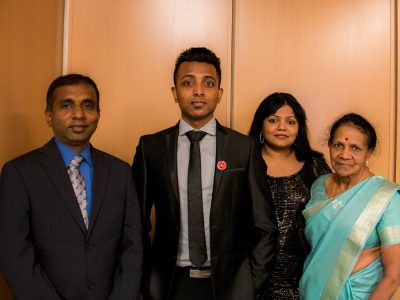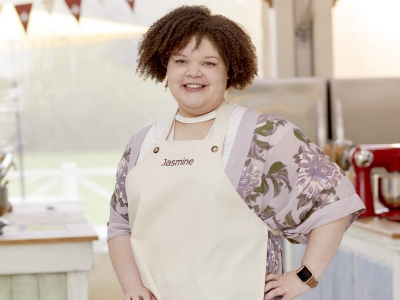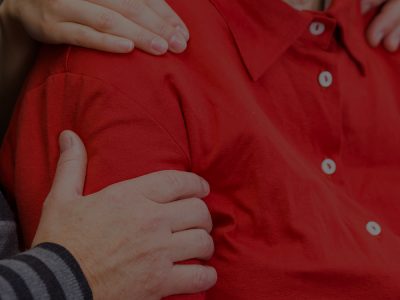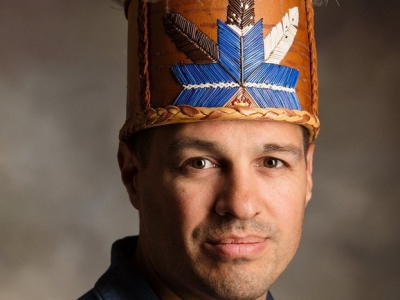By Mary Giles
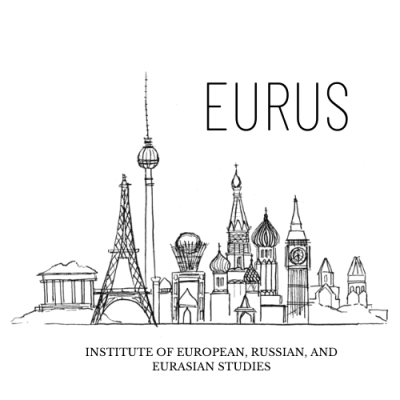
“EURUS is like a family,” says Jeff Sahadeo, director of the Institute of European, Russian and Eurasian Studies. “We’re a small, tight-knit community. Faculty and students have lively debate and discussion and are able to learn new perspectives from each other.”
EURUS is celebrating its 50th anniversary this year. In 1971, the Institute of Soviet and East European Studies (now EURUS) was created as a unit in the Faculty of Public Affairs. “We are looking forward to celebrating our 50th anniversary with faculty, staff, students, alumni and the broader EURUS community when we can get together again in person,” says Sahadeo.
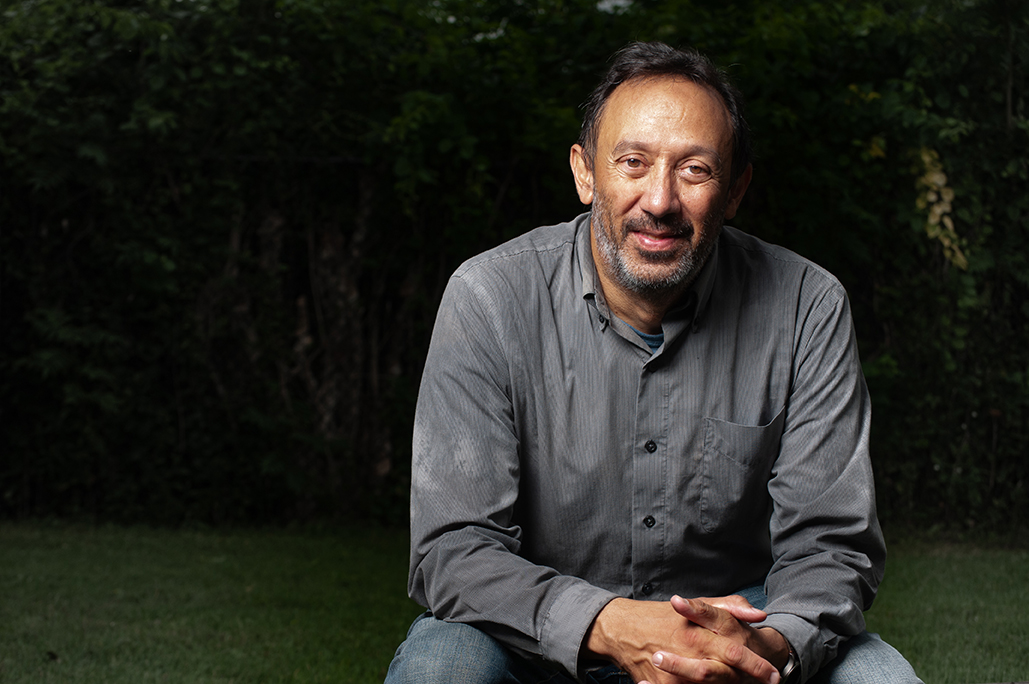
Director Jeff Sahadeo
“I did my MA here when the Soviet Union collapsed,” he says. “It was a time of such excitement and I won’t forget meeting the last Soviet leader, Mikhail Gorbachev, when he came to Carleton.
“I was actually the first student to graduate with an MA in Central-East European and Russian-Area Studies. Coming back to EURUS after my PhD was a dream for me and I still seek to maintain the collegial and intellectual atmosphere and broaden opportunities for our graduates.”
Interdisciplinary Programs
EURUS offers several dynamic, interdisciplinary programs: an MA in European, Russian and Eurasian Studies, a graduate diploma in European Integration Studies, a BA in European and Russian Studies and a specialization — Europe and Russia in the World — through the Bachelor of Global and International Studies (BGInS).
Faculty connections and student programs in EURUS stretch from the United Kingdom to Kyrgyzstan, with strong linkages to the European Union and Russia at academic and government levels.
Students explore topics through the lens of history, politics, literature, culture, business and economics. Democratization, identity and post-communist transition are investigated through aspects of transnational governance, inter-ethnic relations, and gender and politics in the 21st century. Students can study Russian, German, French and Italian or even lesser-spoken languages such as Georgian.
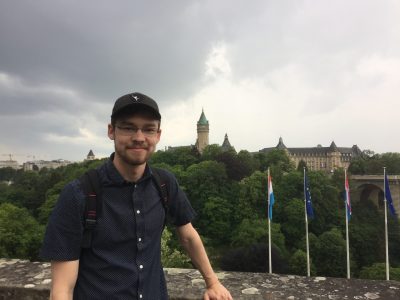
EURUS MA student Paul Sjoberg participated in the EU Study Tour and Internship program from May to August 2018. Paul stands in front of the Plateau Bourbon, in Luxembourg City, Luxembourg, visiting the Court of Justice of the European Union. Over three weeks, Paul visited with EU officials in Brussels, Antwerp, Luxembourg, Frankfurt and Strasbourg. Paul then had a two-month internship in Brussels, where he worked on EU-related issues alongside EU officials.
High-profile experts, foreign visitors and embassy personnel speak in classes and events. Students can also take advantage of study tours, student experiences abroad and other professional opportunities.
“The pandemic has made these programs virtual, but also allows for new ways of connecting,” says Sahadeo. “Our internships can now be done with NGO’s and consulting firms in Toronto and Montreal. We have events with panels of students and colleagues from Europe, New York, California and Ottawa.
“Of course, we lose that sociability and the after-event mixing that are so important. We are all looking forward to getting back to campus.”
Faculty Research
For a very small unit, EURUS faculty have recently won many grants and awards.
Sahadeo holds a 2019 SSHRC Insight Development Grant for “White Water or White Coal? Rivers and Society in Tsarist and Soviet Georgia.” He was awarded the 2020 Taylor and Francis Book Prize for Voices from the Soviet Edge, which uses oral history interviews, archival and published materials to tell the story of migrant populations in Leningrad and Moscow at the end of the Soviet era.
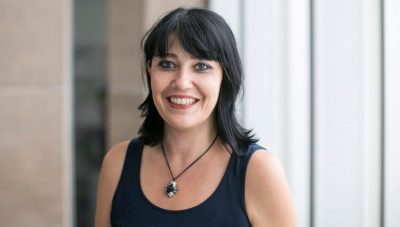
Crina Viju-Miljusevic
Crina Viju-Miljusevic’s Jean Monnet project, EU Learning in Canadian High Schools, promotes a broader and deeper understanding of EU integration among high school students in the Ottawa region. The project is supported by a grant from the EU’s Erasmus+ Programme for Education, Training, Youth and Sport. She is also the module co-leader on transatlantic trade and globe trade challenges for the Jean Monnet Network on Transatlantic Trade Politics.
James Casteel was awarded a SSHRC Insight Grant in 2019 to compare and contrast the experiences and memories of Russian Germans and Russian Jews who migrated to Germany after the collapse of the Soviet Union.
“The EU and the Ukraine Crisis: Causes and Consequences” is a SSHRC Insight Grant (2016-2022) research project led by Joan DeBardeleben. The project investigates EU policy toward the east and the 2014 Ukraine crisis.
Achim Hurrelmann holds an Insight Grant awarded in 2019 to study the impact of Brexit on Canada and its relationship to Europe. He also leads the Jean Monnet Network from the European Commission awarded in 2020 (along with other colleagues in EURUS).
Former EURUS director Piotr Dutkiewicz has attracted important external funding from the private sector, including the Kinross Gold Fund for Russian Studies, established in 2017. The Fund supports student research on Russia and Russian language training as well as major events, including this year’s Graduate Student Research Conference. He also presides over an international jury and administers an annual Russian Writing Contest, which celebrates Russian-Canadian heritage and diversity in Canada. It is also a way for students to demonstrate their knowledge of Russian language, literature and history.
McMillan Chair in Russian Studies
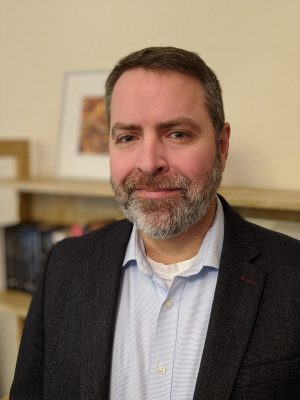
Paul Goode
Paul Goode joined EURUS in January 2021 as the inaugural McMillan Chair in Russian Studies. His current research focuses on nationalism and authoritarianism in Russia and the post-Soviet region, as well as the role of artificial intelligence (AI) in Russia’s geopolitical competition and national identity.
Patriotism without Patriots: Everyday Patriotism and Legitimacy in Putin’s Russia, one of Goode’s current projects, unpacks patriotism as both a field for competition among Russia’s political elite and as apolitical everyday practices for ordinary Russians.
“Taken together, these elite and everyday dynamics help to explain support for autocratic rule despite Russians’ discontent with their political situation,” says Goode. “National pride remains strong in Russia, but it does not mean unconditional happiness with the political situation.”
Goode’s latest project on AI examines its implications for both nationalism and authoritarian rule in countries like Russia. “AI challenges nationhood, national boundaries and sovereignty, which depends on immense reserves of population data. The Russian government is working intensively to stay ahead of the curve on AI and make it work, even if its long-term consequences are unknown.”
The McMillan Chair will be a hub for faculty, students and other scholars to research and collaborate on Russian politics. It will also enhance student contact with the region and provide global study opportunities and learning exchanges between Canadian and Russian students.
The endowed research chair originated with a donation by Professor Emeritus Carl McMillan, who was director of EURUS from 1975 to 1981 and again in 1995 to 1997. Before joining Carleton in 1968, Professor McMillan had a career in the United States Navy and the U.S. Foreign Service where he held a diplomatic posting in Moscow at the height of the Cold War.
Alumni Network
EURUS alumni work all over the world. The vibrant alumni networks help to place graduates in successful careers in diverse areas.
Alumni work at Global Affairs Canada, National Defence, Immigration, Refugees and Citizenship Canada and other government departments. Others work in the private sector, NGOs or organizations like the Red Cross or the Global Centre for Pluralism. Some EURUS alumni continue their education in law school or receive funding for PhD programs.
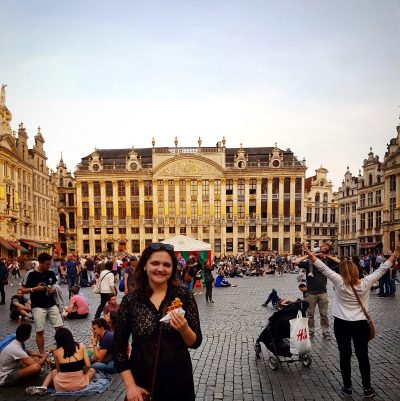
Nadiya Safonova (MA ’20) eating Liege waffles in Grand Place, Brussels, where she stopped to visit a EURUS colleague. Nadiya then went on to Darmstadt, Germany, to complete a research internship to study European Union-Russia relations.
EURUS is hosting a series of Alumni Coffee events to bring alumni and students together to discuss life after graduation. The first coffee chat launched January 22. Alumna Nadiya Safonova, currently at Immigration, Refugees and Citizenship Canada, and student Alexina McLeod, at Global Affairs Canada, discussed their experiences in the EURUS co-op program. Other topics have included international government work, NGO, private sector and consulting work, national defence and public safety, and law school and PhD opportunities.
“Although we can’t connect in person with our alumni this year, it’s great to have alumni attend or speak at our events,” says Sahadeo. “In EURUS, students get to learn what they love and then they get to go and work in a field they are passionate about.”
 |
On March 24 and 25, EURUS will host its annual Graduate Student Research Conference. The keynote speaker for the interdisciplinary forum, “Europe and Russia: Regional Approaches, Global Perspectives,” is Alison Grant, director of Eastern Europe and Eurasia at Global Affairs Canada. Students will present their original research on national and regional challenges including distanced states and societies and Europe and Russia in a global context.
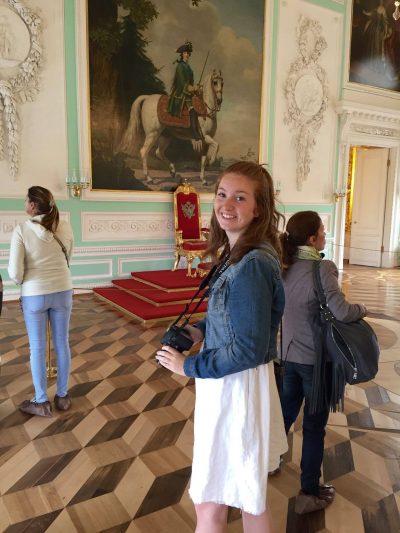 EURUS MA student Leah Rasmussen travelled to St. Petersburg, Russia in August 2019. Leah poses in the Throne Room of the Grand Palace at Peterhof in front of the throne of Peter the Great and portrait of Catherine the Great. During her trip Leah explored many of the palaces and parks of St. Petersburg, some of which play an integral role in her MA thesis. “Being virtual, the conference will include students from across Canada, the United States, Russia and even Pakistan,” says Sahadeo. “Seven EURUS MA students will present original and exciting research. Leah Rasmussen is examining the link between culture and power through transnational museum exhibits, in this case a display of Russian Art at the Royal Academy of London. “Sean Havel will present his research on European Union efforts to overcome decades of failed attempts to coordinate on foreign policy and gain traction as a regional and global strategic actor.” On March 26, the Centre for European Studies (CES), which is operated jointly by EURUS and the Department of Political Science, will host an international policy workshop, CETA: Where Are We Three Years Later? The event will discuss the Comprehensive Economic and Trade Agreement (CETA) and its practical implications. Crina Viju-Miljusevic, associate director of CES and the next director of EURUS starting July 1, says, “The international workshop brings together speakers from Canada and Europe to discuss the impacts of one of the most comprehensive trade agreements signed to date. Understanding the strengths and weaknesses of such agreements, as well as opportunities they open up for businesses, is even more crucial now when countries fight the COVID-19 pandemic and implement economic recovery plans.” |
Monday, March 15, 2021 in Featured, FPA Voices
Share: Twitter, Facebook
